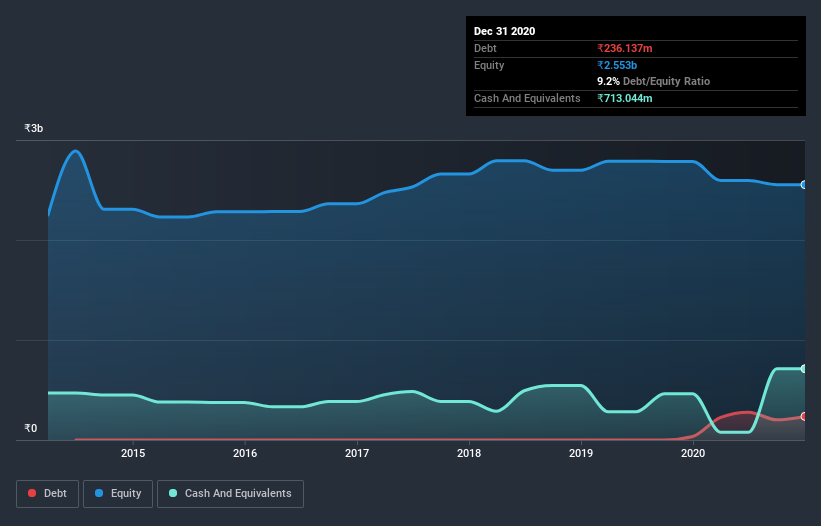
The external fund manager backed by Berkshire Hathaway's Charlie Munger, Li Lu, makes no bones about it when he says 'The biggest investment risk is not the volatility of prices, but whether you will suffer a permanent loss of capital.' When we think about how risky a company is, we always like to look at its use of debt, since debt overload can lead to ruin. We can see that Aptech Limited (NSE:APTECHT) does use debt in its business. But the more important question is: how much risk is that debt creating?
When Is Debt A Problem?
Debt is a tool to help businesses grow, but if a business is incapable of paying off its lenders, then it exists at their mercy. If things get really bad, the lenders can take control of the business. However, a more common (but still painful) scenario is that it has to raise new equity capital at a low price, thus permanently diluting shareholders. Of course, debt can be an important tool in businesses, particularly capital heavy businesses. When we examine debt levels, we first consider both cash and debt levels, together.
View our latest analysis for Aptech
How Much Debt Does Aptech Carry?
As you can see below, at the end of September 2020, Aptech had ₹202.0m of debt, up from ₹35.5m a year ago. Click the image for more detail. But on the other hand it also has ₹713.0m in cash, leading to a ₹511.1m net cash position.

How Strong Is Aptech's Balance Sheet?
We can see from the most recent balance sheet that Aptech had liabilities of ₹792.8m falling due within a year, and liabilities of ₹29.2m due beyond that. On the other hand, it had cash of ₹713.0m and ₹636.5m worth of receivables due within a year. So it can boast ₹527.6m more liquid assets than total liabilities.
This surplus suggests that Aptech has a conservative balance sheet, and could probably eliminate its debt without much difficulty. Simply put, the fact that Aptech has more cash than debt is arguably a good indication that it can manage its debt safely. When analysing debt levels, the balance sheet is the obvious place to start. But you can't view debt in total isolation; since Aptech will need earnings to service that debt. So when considering debt, it's definitely worth looking at the earnings trend. Click here for an interactive snapshot.
In the last year Aptech had a loss before interest and tax, and actually shrunk its revenue by 48%, to ₹1.3b. To be frank that doesn't bode well.
So How Risky Is Aptech?
We have no doubt that loss making companies are, in general, riskier than profitable ones. And the fact is that over the last twelve months Aptech lost money at the earnings before interest and tax (EBIT) line. Indeed, in that time it burnt through ₹78m of cash and made a loss of ₹47m. Given it only has net cash of ₹511.1m, the company may need to raise more capital if it doesn't reach break-even soon. Even though its balance sheet seems sufficiently liquid, debt always makes us a little nervous if a company doesn't produce free cash flow regularly. When analysing debt levels, the balance sheet is the obvious place to start. But ultimately, every company can contain risks that exist outside of the balance sheet. To that end, you should learn about the 4 warning signs we've spotted with Aptech (including 1 which is a bit concerning) .
If, after all that, you're more interested in a fast growing company with a rock-solid balance sheet, then check out our list of net cash growth stocks without delay.
If you’re looking to trade Aptech, open an account with the lowest-cost* platform trusted by professionals, Interactive Brokers. Their clients from over 200 countries and territories trade stocks, options, futures, forex, bonds and funds worldwide from a single integrated account. Promoted
New: Manage All Your Stock Portfolios in One Place
We've created the ultimate portfolio companion for stock investors, and it's free.
• Connect an unlimited number of Portfolios and see your total in one currency
• Be alerted to new Warning Signs or Risks via email or mobile
• Track the Fair Value of your stocks
This article by Simply Wall St is general in nature. It does not constitute a recommendation to buy or sell any stock, and does not take account of your objectives, or your financial situation. We aim to bring you long-term focused analysis driven by fundamental data. Note that our analysis may not factor in the latest price-sensitive company announcements or qualitative material. Simply Wall St has no position in any stocks mentioned.
*Interactive Brokers Rated Lowest Cost Broker by StockBrokers.com Annual Online Review 2020
Have feedback on this article? Concerned about the content? Get in touch with us directly. Alternatively, email editorial-team (at) simplywallst.com.
About NSEI:APTECHT
Flawless balance sheet established dividend payer.

